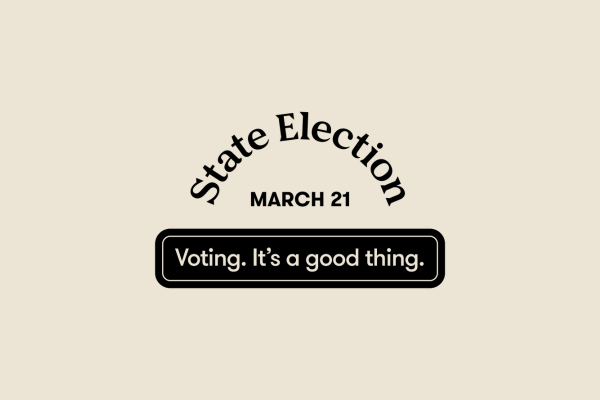About ECSA
- Details
Strategic Plan 2025 - 2028
The Electoral Commission of South Australia’s (ECSA) Strategic Plan sets the direction for the next 3 years, focusing on three key goals:
- Elections delivered with integrity.
- Strengthening public awareness and trust in electoral services.
- Building a trusted and future-ready organisation.
In a rapidly changing environment with rising expectations and increasing complexity, ECSA is committed to robust governance, resilient systems, and a skilled, adaptable workforce.
The plan prioritises integrity, legislative compliance, responsible resource management, and inclusive engagement and is structured to advance organisational objectives within the parameters of ECSA’s established risk appetite.
Download Stragetic Plan 2025 - 2028 [PDF]
ARCHIVE
Previous plans
- Details

Fake or misleading information

2026 State Election
Subscribe to updates and notices
- Request to subscribe via
This email address is being protected from spambots. You need JavaScript enabled to view it. - Information and daily tallys
- Election Media Releases and News

Contact: 0401 149 166
When emailing, include a brief description with your deadline.
This email address is being protected from spambots. You need JavaScript enabled to view it. ECSA Media- News
- Publications
- Reports (State Elections)
- Social Media

Electoral Reform
For the Electoral (Accountability and Integrity) Amendment Act 2024.
For further information
This email address is being protected from spambots. You need JavaScript enabled to view it.
ECSA TV Playlist on YouTube
Local Government Videos
- Details
Our social media channels are used to raise public awareness about elections in South Australia.
Follow us on our official social media accounts and keep up to date with our activities and services:
We also advertise via online platforms that may not be listed above. However, these ads will always have an authorisation message.
We encourage the dissemination and re-use of information provided via our socials.
Social media terms of use
Being followed or re-shared by ECSA does not imply endorsement of any kind.
Content is authorised by M. Sherry, Electoral Commissioner.
Monitoring
Our social media channels are monitored between 9:00 am and 5:00 pm Monday to Friday.
While every effort is made to read messages and comments and respond when possible, ECSA cannot reply to all messages and comments received.
Send your enquiry using the form on our Contact Us page (linked)
Send feedback and complaints via this form (linked)
If you are concerned about a specific piece of content you've seen on social media or on a digital platform (eg a claim made by someone), this may be covered by the platform's own usage policies. We recommend that you report this directly to the platform. If it is part of campaign, you could review the Electoral advertising guidelines on our website, here, or via our "Check the source" news.
Moderation
We encourage constructive and respectful discussions and comments in our online community.
When contributing to ECSA’s social media accounts please:
- post material that is relevant to the topics or issues being discussed
- represent your own views (do not impersonate any other person)
- protect your privacy by not including personal information about yourself or others.
We reserve the right to remove, block or report comments or users that post:
- misleading statements
- inappropriate, obscene or offensive language or images
- discriminatory material particularly based on disability, race, gender, religion, age, sexual orientation, or ethnicity
- abuse, harassment or threats
- defamatory statements
- promotion of commercial, personal or professional interests
- overtly political comments
- information that violates the privacy of our staff
- irrelevant or redundant comments.
- Details
Our year at a glance
Following is a snapshot of data and statistics from the 2021-22 financial year.
Download a copy of the Annual Report 2021-22 (PDF, 960KB)
Our people
| Number of staff | 30 | |
| FTEs | 29.33 | |
| Gender | Persons | FTE |
| Female | 53.3% | 52.3% |
| Male | 46.7% | 47.7% |
| No. persons separated from the agency during 2021-22 | 12 | |
| No. persons recruited to the agency during 2021-22 | 12 | |
| No. persons on leave without pay at 30/6/22 | 2 | |
Elections
State elections
House of Assembly
| District | Polling day | Ratio of candidates to vacancy | Election contested | Electors on the roll | Participation | Participation (%) |
| Adelaide | 19/03/2022 | 6:1 | Y | 27,331 | 23,892 | 87.4 |
| Badcoe | 19/03/2022 | 7:1 | Y | 27,481 | 24,493 | 89.1 |
| Black | 19/03/2022 | 3:1 | Y | 26,437 | 24,327 | 92.0 |
| Bragg | 19/03/2022 | 4:1 | Y | 26,709 | 24,157 | 90.4 |
| Chaffey | 19/03/2022 | 6:1 | Y | 25,807 | 23,091 | 89.5 |
| Cheltenham | 19/03/2022 | 5:1 | Y | 27,621 | 24,336 | 88.1 |
| Colton | 19/03/2022 | 3:1 | Y | 28,379 | 25,864 | 91.1 |
| Croydon | 19/03/2022 | 4:1 | Y | 28,182 | 23,948 | 85.0 |
| Davenport | 19/03/2022 | 4:1 | Y | 26,835 | 24,687 | 92.0 |
| Dunstan | 19/03/2022 | 4:1 | Y | 27,269 | 24,447 | 89.7 |
| Elder | 19/03/2022 | 7:1 | Y | 27,757 | 25,185 | 90.7 |
| Elizabeth | 19/03/2022 | 5:1 | Y | 27,717 | 22,982 | 82.9 |
| Enfield | 19/03/2022 | 5:1 | Y | 27,240 | 23,995 | 88.1 |
| Finniss | 19/03/2022 | 7:1 | Y | 27,086 | 24,951 | 92.1 |
| Flinders | 19/03/2022 | 6:1 | Y | 25,108 | 21,883 | 87.2 |
| Florey | 19/03/2022 | 5:1 | Y | 26,361 | 23,150 | 87.8 |
| Frome | 19/03/2022 | 5:1 | Y | 26,915 | 24,381 | 90.6 |
| Gibson | 19/03/2022 | 5:1 | Y | 28,207 | 25,110 | 89.0 |
| Giles | 19/03/2022 | 6:1 | Y | 24,966 | 20,166 | 80.8 |
| Hammond | 19/03/2022 | 7:1 | Y | 26,584 | 23,533 | 88.5 |
| Hartley | 19/03/2022 | 3:1 | Y | 26,158 | 23,446 | 89.6 |
| Heysen | 19/03/2022 | 5:1 | Y | 26,049 | 24,344 | 93.5 |
| Hurtle Vale | 19/03/2022 | 6:1 | Y | 26,506 | 23,629 | 89.1 |
| Kaurna | 19/03/2022 | 5:1 | Y | 28,845 | 25,315 | 87.8 |
| Kavel | 19/03/2022 | 6:1 | Y | 27,164 | 24,789 | 91.3 |
| King | 19/03/2022 | 7:1 | Y | 27,193 | 24,942 | 91.7 |
| Lee | 19/03/2022 | 4:1 | Y | 25,846 | 22,877 | 88.5 |
| Light | 19/03/2022 | 5:1 | Y | 26,719 | 23,548 | 88.1 |
| MacKillop | 19/03/2022 | 5:1 | Y | 27,214 | 24,317 | 89.4 |
| Mawson | 19/03/2022 | 7:1 | Y | 27,500 | 24,753 | 90.0 |
| Morialta | 19/03/2022 | 4:1 | Y | 26,680 | 24,440 | 91.6 |
| Morphett | 19/03/2022 | 3:1 | Y | 26,221 | 23,280 | 88.8 |
| Mount Gambier | 19/03/2022 | 4:1 | Y | 25,597 | 22,867 | 89.3 |
| Narungga | 19/03/2022 | 7:1 | Y | 25,098 | 22,950 | 91.4 |
| Newland | 19/03/2022 | 9:1 | Y | 26,866 | 24,408 | 90.9 |
| Playford | 19/03/2022 | 5:1 | Y | 26,660 | 23,308 | 87.4 |
| Port Adelaide | 19/03/2022 | 5:1 | Y | 28,354 | 24,992 | 88.1 |
| Ramsay | 19/03/2022 | 4:1 | Y | 27,821 | 23,303 | 83.8 |
| Reynell | 19/03/2022 | 4:1 | Y | 27,175 | 23,752 | 87.4 |
| Schubert | 19/03/2022 | 7:1 | Y | 27,424 | 25,411 | 92.7 |
| Stuart | 19/03/2022 | 5:1 | Y | 25,266 | 21,976 | 87.0 |
| Taylor | 19/03/2022 | 6:1 | Y | 27,752 | 23,196 | 83.6 |
| Torrens | 19/03/2022 | 4:1 | Y | 28,173 | 24,914 | 88.4 |
| Unley | 19/03/2022 | 3:1 | Y | 27,592 | 24,860 | 90.1 |
| Waite | 19/03/2022 | 6:1 | Y | 27,857 | 25,782 | 92.6 |
| West Torrens | 19/03/2022 | 3:1 | Y | 26,327 | 23,476 | 89.2 |
| Wright | 19/03/2022 | 4:1 | Y | 26,670 | 24,189 | 90.7 |
Legislative Council
| Election | Declaration of result | Ratio of candidates to vacancy | Election contested | Electors on the roll | Participation | Participation (%) |
| Legislative Council | 27/04/2022 | 51:11 | Y | 1,266,719 | 1,129,680 | 89.2 |
Council elections
| Election | Declaration of result | Ratio of candidates to vacancy | Election contested | Electors on the roll | Participation | Participation (%) |
| District Council of Streaky Bay - Eyre Ward | 12/07/2021 | 1:1 | n/a |
n/a |
n/a |
n/a |
| District Council of Streaky Bay - Flinders Ward | 12/07/2021 | 2:1 | Y | 783 | 321 | 41.0 |
| District Council of Streaky Bay - Flinders Ward | 22/07/2021 | 1:1 | N |
n/a |
n/a |
n/a |
| City of Adelaide - Area Councillor | 26/07/2021 | 7:1 | Y | 27,963 | 4,897 | 17.5 |
| District Council of Tumby Bay - Area Councillor | 13/09/2021 | 5:1 | Y | 2,009 | 951 | 47.3 |
| The Flinders Ranges Council - Area Councillors | 13/09/2021 | 3:2 | Y | 1,172 | 474 | 40.4 |
| Wattle Range Council - Riddoch Ward | 7/10/2021 | 1:1 | N |
n/a |
n/a |
n/a |
| City of Port Adelaide Enfield - Outer Harbor Ward | 19/10/2021 | 6:1 | Y | 10,249 | 2,621 | 25.6 |
| Coorong District Council - Poll | 26/10/2021 |
n/a |
n/a |
3,752 | 1,173 | 31.3 |
| City of Holdfast Bay - Somerton Ward | 15/11/2021 | 4:1 | Y | 7,208 | 1,780 | 24.7 |
| City of Tea Tree Gully - Hillcott Ward | 13/12/2021 | 8:1 | Y | 11,832 | 2,240 | 18.9 |
| Mid Murray Council - Eyre Ward | 21/02/2022 | 3:1 | Y | 2,042 | 623 | 30.5 |
Other statutory elections
| Election | Date | Election type | Election contested | Number elected | Electoral system used | Number of electors |
| APY Executive Board general elections - Election of male member for Pipalyatjara and Kalka | 4/08/2021 | Election of male member | Y | 1 | First past the post | 141 |
| APY Executive Board general elections - Election of female member for Pipalyatjara and Kalka | 4/08/2021 | Election of female member | N | 1 |
n/a |
n/a |
| APY Executive Board general elections - Election of male member for Kanpi, Nyapari, Angatja and Watarru | 4/08/2021 | Election of male member | N | 1 |
n/a |
n/a |
| APY Executive Board general elections - Election of female member for Kanpi, Nyapari, Angatja and Watarru | 4/08/2021 | Election of female member | N | 1 |
n/a |
n/a |
| APY Executive Board general elections - Election of male member for Amata and Tjurma | 4/08/2021 | Election of male member | N | 1 |
n/a |
n/a |
| APY Executive Board general elections - Election of female member for Amata and Tjurma | 4/08/2021 | Election of female member | N | 1 |
n/a |
n/a |
| APY Executive Board general elections - Election of male member for Kaltjiti, Irintata and Watinuma | 4/08/2021 | Election of male member | Y | 1 | First past the post | 165 |
| APY Executive Board general elections - Election of female member for Kaltjiti, Irintata and Watinuma | 4/08/2021 | Election of female member | N | 1 |
n/a |
n/a |
| APY Executive Board general elections - Election of male member for Pukatja, Yunyarinyi, Anilalya and Turkey Bore | 4/08/2021 | Election of male member | Y | 1 | First past the post | 346 |
| APY Executive Board general elections - Election of female member for Pukatja, Yunyarinyi, Anilalya and Turkey Bore | 4/08/2021 | Election of female member | Y | 1 | First past the post | 346 |
| APY Executive Board general elections - Election of male member for Mimili | 4/08/2021 | Election of male member | N | 1 |
n/a |
n/a |
| APY Executive Board general elections - Election of female member for Mimili | 4/08/2021 | Election of female member | N | 1 |
n/a |
n/a |
| APY Executive Board general elections - Election of male member for Iwantja, Amuruna, Railway Bore, Witjintitja and Wallatinna | 4/08/2021 | Election of male member | N | 1 |
n/a |
n/a |
| Super SA | 6/09/2021 | Election of 2 board members | Y | 2 | Optional preferential | 191,428 |
| Funds SA | 19/07/2021 | Election of one board member | N | 1 |
n/a |
n/a |
| APY Executive Board supplementary election for a female member for Iwantja, Amuruna, Railway Bore, Witjintitja and Wallatinna | 1/12/2021 | Supplementary election of female member for Iwantja, Amuruna, Railway Bore, Witjintitja and Wallatinna | N | 1 |
n/a |
n/a |
Community and commercial elections
| Organisation | Date | Election type | Number elected | Voting method | Number of electors |
| Assistants to the Members of the South Australia Parliament Enterprise Agreement | 9/12/2021 | Enterprise agreement ballot | N/A | Yes – No First past the post |
N/A |
Enrolment
South Australia enrolment rate as at 30 June 2022
| Enrolment | 30 June 2022 | 30 June 2021 | 30 June 2010 | 30 June 2019 | 30 June 2018 |
| Enrolment for federal/state and state-only electors | 1,273,143 | 1,239,103 | 1,224,894 | 1,216,151 | 1,201,245 |
| Estimated eligible population* | 1,309,192 | 1,283,395 | 1,263,503 | 1,248,996 | 1,241,490 |
| Total enrolled as % of estimated eligible population* | 97.2% | 96.5% | 96.9% | 97.4% | 96.8% |
Electors enrolled by age group at 30 June 2022
|
Age group |
No. |
% of estimated eligible population* |
|
18-24 |
117,936 |
87.8 |
|
25-29 |
95,101 |
97.6 |
|
30-34 |
97,509 |
98.1 |
|
35-39 |
103,246 |
98.1 |
|
40-44 |
97,737 |
98.7 |
|
45-49 |
98,762 |
98.1 |
|
50-54 |
107,715 |
97.7 |
|
55-59 |
104,663 |
97.1 |
|
60-64 |
107,005 |
97.6 |
|
65-69 |
97,291 |
#99.0 |
|
70+ |
246,178 |
#99.0 |
|
Total enrolled |
1,273,143 |
97.2 |
* Estimated eligible population is calculated by the Australian Electoral Commission (AEC) using ABS citizen population figures for 30 June 2021 (preliminary) based on the 2021 Census, projected forward to the relevant date using ABS citizen population trends between 30 June 2020 (revised) and 30 June 2021 (preliminary) based on the 2016 Census. The AEC then makes adjustments for British Subjects, those of unsound mind, overseas electors and new citizens since the Census.
# Enrolment rates above 99.0% are not reported due to errors associated with calculating the estimated eligible population which may overstate the actual enrolment rate.
Enrolment transactions 2018 to 2022
| Enrolment activity | 2021-22 | 2020-21 | 2019-20 | 2018-19 | 2017-16 |
| As at 1 July of each year | 1,239,103 | 1,224,894 | 1,216,151 | 1,201,245 | 1,187,714 |
| Additions to the roll | |||||
| New enrolments* | 42,461 | 22,480 | 23,496 | 27,477 | 27,610 |
| Re-enrolments | 4,514 | 2,893 | 4,351 | 5,109 | 5,238 |
| Re-instatements | 73 | 19 | 25 | 143 | 67 |
| Interstate transfers to SA | 19,385 | 12,974 | 11,112 | 15,267 | 14,235 |
| Net additions | 66,433 | 38,366 | 38,984 | 47,996 | 47,150 |
| Movements within state** | |||||
| Transfers between districts | 97,232 | 69,787 | 74,255 | 80,728 | 86,541 |
| Changes within district | 51,046 | 32,089 | 34,209 | 42,648 | 49,974 |
| No change/amendments | 55,103 | 5,854 | 7,491 | 20,235 | 40,535 |
| Deletions from the roll | |||||
| Removal by objection | 3,085 | 1,816 | 6,665 | 5,737 | 3,602 |
| Deaths | 12,707 | 10,877 | 10,932 | 10,793 | 11,735 |
| Duplications | 198 | 170 | 701 | 309 | 496 |
| Cancellations | 145 | 172 | 169 | 170 | 16 |
| Interstate transfers from SA | 16,253 | 11,119 | 11,776 | 16,084 | 17,777 |
| Net deletions | 32,388 | 24,154 | 30,243 | 3,093 | 33,626 |
| Adjustments (net)*** | -5 | -3 | +2 | +3 | +7 |
| Total enrolled 30/06/21 | 1,273,143 | 1,239,103 | 1,224,894 | 1,216,151 | 1,201,245 |
* Includes persons who provisionally enrolled that have turned 18 and new enrolments by 18-year-olds (17,426 in 2021-22).
** These ‘movements within state’ figures are not included in the table totals .
*** Net adjustments and data corrections.
Registered declaration voters by criteria at 30 June 2021
ECSA maintains a register of voters who are prevented from attending a polling booth and meet certain criteria. These voters are called registered declaration voters for state elections and general postal voters for federal elections. Once registered, a voter will receive a postal vote for every election and does not need to re-apply for future elections.
| Criteria | No. | % |
| Caring for a person who is seriously ill, infirm or disabled | 2,752 | 8.6 |
| Place of residence is not within 20 kilometres of a polling place | 3,320 | 10.4 |
| Physical disability | 12,398 | 38.8 |
| Membership of a religious order or religious beliefs | 902 | 2.8 |
| Address has been suppressed from publication on the roll (silent elector) | 12,551 | 39.3 |
| Total | 31,923 | 100% |
Register of political parties
| New party registrations | 7 |
| Annual returns lodged | 8 |
| De-registrations* | 0 |
| Registered parties as at 30 June 2022 | 15 |
Register
|
Date of registration |
Political party |
Abbreviation of party name |
|
17/10/85 |
Australian Labor Party (South Australian Branch) |
Australian Labor Party |
|
17/10/85 |
Liberal Party of Australia (SA Division) |
Liberal Party |
|
17/10/85 |
National Party of Australia (SA) Inc |
The Nationals |
|
13/02/96 |
Australian Greens SA |
The Greens |
|
24/11/16 |
Animal Justice Party |
|
|
04/07/17 |
SA-BEST Incorporated |
SA-BEST |
|
07/11/17 |
Advance SA |
|
|
12/12/17 |
Child Protection Party |
CPP |
|
16/09/21 |
Pauline Hanson's One Nation |
|
|
11/11/21 |
Australian Family Party |
Aust Family Party |
|
13/01/22 |
Family First Party Inc |
Family First |
|
20/01/22 |
SA Party - Stop Overdevelopment & Corruption |
SA Party |
|
20/01/22 |
Real Change SA |
|
|
27/01/22 |
Legalise Cannabis South Australia Party |
LCSA Party |
|
27/01/22 |
Liberal Democratic Party |
Liberal Democrats less government more freedom |
Funding, disclosure and returns
Returns
Political party, associated entity and donor returns are lodged on a half-yearly basis and must be lodged within 30 days of the end of the half-yearly period.
Returns: 1 January 2021 to 30 June 2021
| Return type | Total lodged | Late returns |
| Political party | 8 | 0 |
| Associated entity | 24 | 8 |
| Third party | 1 | 1 |
| Donor | 8 | 2 |
| Large gift | 5 | 0 |
Returns: 1 July 2021 to 31 December 2021
| Return type | Total lodged | Late returns |
| Political party | 10 | 3 |
| Associated entity | 24 | 3 |
| Third party | 1 | 0 |
| Donor | 8 | 4 |
| Large gift | 3 | 0 |
| Campaign donation | 22 | 10 |
Annual political expenditure returns lodged for the 2020-21 financial year
| Return type | Total lodged | Late returns |
| Political party | 4 | 2 |
| Individual | 0 | 0 |
| Organisation | 1 | 1 |
| Associated entity | 0 | 0 |
| Third party | 1 | 1 |
All returns lodged are available on ECSA’s Funding and Disclosure Portal.
Public funding
|
Claim period |
Australian Labor Party |
Liberal Party |
The Greens |
SA-Best |
Advance SA |
Total |
|
$ |
$ |
$ |
$ |
$ |
$ |
|
|
01/07/2021 – 31/12/2021 |
66,908 |
66,908 |
39,030 |
39,030 |
- |
|
|
01/01/2022 – 30/06/2022 |
66,908 |
66,908 |
39,030 |
27,901.55 |
- |
|
|
Total |
133,816 |
133,816 |
78,060 |
66,931.55 |
|
412,623.55 |
Election funding
2022 State Election
|
Registered political parties |
|
|
Participant |
$ |
|
Australian Labor Party |
2,809,226.25 |
|
Liberal Party |
2,557,748.45 |
|
The Greens |
652,532.98 |
|
Family First |
256,108.45 |
|
Pauline Hanson’s One Nation |
45,738.22 |
|
Animal Justice Party |
4,023.39 |
|
The Nationals |
12,754.42 |
|
Liberal Democrats |
6,380.00 |
|
SA-BEST |
7,272.85 |
|
Legalise Cannabis SA |
985.00 |
|
Independent candidates |
|
|
Dan Golding |
8,066.33 |
|
Tessa Kowaliw |
5,184.66 |
|
Cate Hunter |
12,029.48 |
|
Dan Cregan |
40,866.65 |
|
Troy Bell |
30,648.02 |
|
Fraser Ellis |
23,915.65 |
|
Frances Bedford |
9,584.35 |
|
Geoff Brock |
25,101.66 |
|
Sam Duluk |
16,579.15 |
|
Dianah Walter |
7,139.66 |
|
Total |
6,531,885.62 |
Non-voter activity
Non-voter activity
Section 85 of the Electoral Act 1985 sets out the procedures to be implemented by the Electoral Commissioner relating to electors who appear to have not voted at an election. The non-voter process commences 3 months after election day and continues until each expiation has been resolved.
The table below outlines the non-voter activity, starting with Notice 1 which gives the elector the opportunity to provide a valid reason for their apparent failure to vote, through to referral of the expiation to the Fines Enforcement and Recovery Unit (FERU).
Once an expiation has been referred to FERU an elector can make an application for a review. If the review is granted the expiation is referred back to ECSA and the expiation is reissued (Notice 2). There is no maximum numbers of review that can be granted. This cycle can occur multiple times if the matter is left unresolved.
| Activity | 2021-22 | 2020-21 | 2019-20 | 2018-19 | 2017-18 |
| Notice 1: Notice of apparent failure to vote (number sent) | † 84,419 | n/a | n/a | * n/a # 8,747 |
* 63,715 |
| Notice 2: Expiation notice (number sent) | n/a | n/a | n/a | * 37,480 # 5,966 |
n/a |
| Notice 3: Reminder expiation notice (number sent) | n/a | n/a | * n/a # 4,046 |
* 27,942 # n/a |
n/a |
| Referrals to the Fines Enforcement and Recovery Unit for enforcement | n/a | n/a | * 257 # 3,278 |
* 23,115 # n/a |
n/a |
| Re-issued expiation notices (number sent) | n/a | * 26 # 18 |
* 1,605 # 413 |
* 3,873 # n/a |
n/a |
| Penalties collected ($) | n/a | $125,617.27 | $389,543.65 | $769,097.43 | $20,447.40 |
* 2018 State Election
# 2019 Cheltenham and Enfield by-elections


